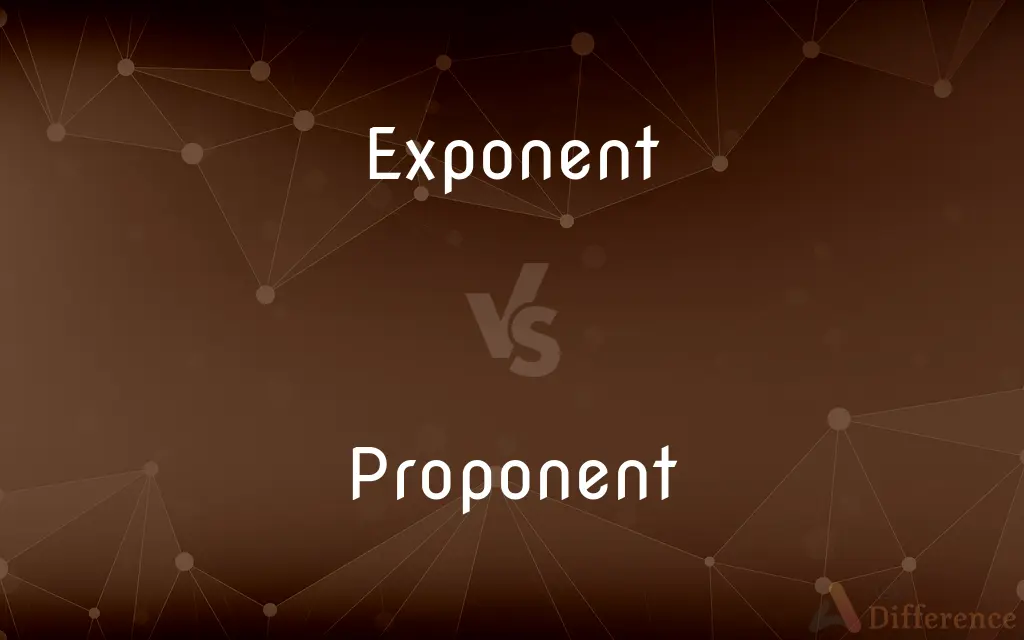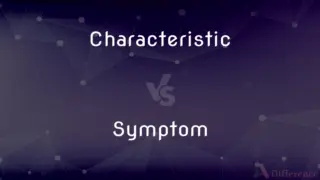Exponent vs. Proponent — What's the Difference?
By Fiza Rafique & Maham Liaqat — Updated on March 11, 2024
Exponent emphasizes expertise or advocacy in a specific field, whereas proponent focuses on support or advocacy of a particular idea or cause.

Difference Between Exponent and Proponent
Table of Contents
ADVERTISEMENT
Key Differences
Exponents are individuals or entities that exemplify or are experts in a certain field or concept, showcasing or promoting its principles through their expertise or performance. For instance, a mathematician may be considered an exponent of mathematical theories due to their deep understanding and ability to apply these concepts effectively. On the other hand, proponents are supporters or advocates of a specific idea, cause, policy, or project. They actively promote and argue in favor of their chosen cause, striving to gain more support and acceptance from the wider community. While exponents demonstrate and embody the principles or skills of a particular domain, proponents work towards convincing others of the value and necessity of an idea or initiative.
Exponents often play a crucial role in advancing knowledge and understanding within their field of expertise. They contribute to the development of new ideas, techniques, and innovations, often leading the way in research and education. Proponents, however, focus on the dissemination and advocacy of ideas rather than their creation. They are instrumental in gathering support, influencing public opinion, and implementing changes based on the ideas they champion.
The role of an exponent can sometimes overlap with that of a proponent when an expert not only demonstrates mastery over a subject but also actively advocates for its broader application or recognition. Conversely, a proponent with deep knowledge of their advocated cause can become an exponent in promoting its understanding and adoption.
In terms of recognition, exponents are often celebrated for their technical mastery, innovations, or contributions to their field. Their work is typically recognized by peers and may be awarded within their professional communities. Proponents, however, gain recognition through their efforts to bring about change, influence policies, or shape public opinion. Their success is measured by the acceptance and implementation of the ideas they support.
The impact of exponents is seen through the advancement of knowledge, skills, and practices within their field, contributing to its evolution and refinement. Proponents impact society by catalyzing change, shaping norms, and influencing the direction of community, policy, or technological advancements. Both play vital roles in societal development, but through distinctly different pathways.
ADVERTISEMENT
Comparison Chart
Definition
An individual who exemplifies or is an expert in a field.
An advocate or supporter of a particular idea or cause.
Role
Demonstrates and embodies principles or skills.
Advocates for and promotes a cause or idea.
Focus
Advancement and demonstration of knowledge or skill.
Dissemination and advocacy of specific ideas or initiatives.
Recognition
Celebrated for technical mastery and contributions.
Recognized for efforts in change, policy influence, or support.
Impact
Advances knowledge and practices within their field.
Influences societal norms, policies, and changes.
Compare with Definitions
Exponent
Expert or Demonstrator.
Marie Curie is an exponent of radioactivity, having conducted pioneering research in the field.
Proponent
Advocate or Supporter.
Martin Luther King Jr. was a proponent of civil rights, advocating for equality and justice.
Exponent
Contributor to Field.
Ada Lovelace is considered an exponent of early computing for her work on Charles Babbage's Analytical Engine.
Proponent
Promoter of Ideas.
Rachel Carson was a proponent of environmental conservation, highlighting the dangers of pesticides.
Exponent
Technical Mastery.
Yo-Yo Ma is an exponent of classical cello music, showcasing exceptional skill and emotional depth.
Proponent
Policy Influencer.
Elizabeth Cady Stanton was a proponent of women's suffrage, playing a key role in the movement for voting rights.
Exponent
Advancer of Knowledge.
Neil deGrasse Tyson is an exponent of astrophysics, making complex concepts accessible to the public.
Proponent
Influencer of Public Opinion.
Elon Musk is a proponent of space exploration, influencing public and private sector interest in Mars.
Exponent
Embodiment of Principles.
Leonardo da Vinci was an exponent of the Renaissance, embodying its values of curiosity and innovation.
Proponent
Change Agent.
Malala Yousafzai is a proponent of female education, campaigning for girls' rights worldwide.
Exponent
One that expounds or interprets.
Proponent
One who argues in support of something; an advocate.
Exponent
One that speaks for, represents, or advocates
Our senator is an exponent of free trade.
Proponent
One who supports something; an advocate
Exponent
Abbr. exp(Mathematics) A number or symbol, as 3 in (x + y)3, placed to the right of and above another number, symbol, or expression, denoting the power to which that number, symbol, or expression is to be raised. Also called power.
Proponent
One who makes a proposal or proposition.
Exponent
Expository; explanatory.
Proponent
(legal) One who propounds a will for probate.
Exponent
One who expounds, represents or advocates.
Proponent
Making proposals; proposing.
Exponent
(mathematics) The number by which a value (called the base) is said to be raised to a power in exponentiation: for example, the in .
Proponent
Making proposals; proposing.
Exponent
The degree to which the root of a radicand is found, for example, the in .
Proponent
One who makes a proposal, or lays down a proposition.
Exponent
(linguistics) A manifestation of a morphosyntactic property.
Proponent
The propounder of a thing.
Exponent
(computing) The part of a floating-point number that represents its exponent value.
Proponent
A person who pleads for a cause or propounds an idea
Exponent
A number, letter, or any quantity written on the right hand of and above another quantity, and denoting how many times the latter is repeated as a factor to produce the power indicated
Exponent
One who, or that which, stands as an index or representative; as, the leader of a party is the exponent of its principles.
Exponent
One who explains, expounds, or interprets.
Exponent
A person who pleads for a cause or propounds an idea
Exponent
Someone who expounds and interprets or explains
Exponent
A mathematical notation indicating the number of times a quantity is multiplied by itself
Common Curiosities
What differentiates an exponent from a proponent?
An exponent exemplifies or is an expert in a specific field, while a proponent supports or advocates for a particular idea or cause.
Can someone be both an exponent and a proponent?
Yes, an individual can be both if they are an expert in a field and actively advocate for its broader application or recognition.
What role do proponents play in society?
Proponents advocate for changes, influence policies, and help shape societal norms and directions.
Are exponents always recognized within their professional community?
Typically, yes, exponents are recognized and sometimes awarded for their contributions and mastery within their field.
How do exponents contribute to their field?
Exponents advance knowledge, innovate, and demonstrate technical mastery, contributing significantly to their field.
Can exponents change the direction of their field?
Yes, through their contributions and innovations, exponents can significantly influence the evolution and direction of their field.
Do proponents need to have a deep understanding of their cause?
While not always experts, a deep understanding enhances a proponent's ability to advocate effectively for their cause.
What motivates proponents to advocate for their causes?
Motivations vary, including personal experiences, perceived injustices, or a desire to see societal improvement.
How do societies benefit from the work of exponents?
Societies benefit from the advancement of knowledge, innovation, and the refinement of practices within various fields.
What is an example of an exponent in the arts?
Frida Kahlo is an exponent of Surrealist and Mexican art, known for her unique style and deep emotional expression.
What challenges do exponents face in their work?
Exponents may face challenges such as funding limitations, skepticism from peers, or the difficulty of breaking new ground in their field.
Is the role of an exponent limited to academic fields?
No, exponents can exist in any field, including arts, sports, technology, and more, where expertise can be demonstrated.
Can proponents influence international policies?
Yes, through global advocacy and networking, proponents can impact international policies and agreements.
How do proponents achieve their goals?
Proponents gather support, influence public opinion, and work towards policy or societal changes to achieve their goals.
Who is a famous proponent of environmental conservation?
Greta Thunberg is a well-known proponent of climate change awareness and action, mobilizing global youth and policy discussions.
Share Your Discovery

Previous Comparison
Characteristic vs. Symptom
Next Comparison
Atomistic vs. HolisticAuthor Spotlight
Written by
Fiza RafiqueFiza Rafique is a skilled content writer at AskDifference.com, where she meticulously refines and enhances written pieces. Drawing from her vast editorial expertise, Fiza ensures clarity, accuracy, and precision in every article. Passionate about language, she continually seeks to elevate the quality of content for readers worldwide.
Co-written by
Maham Liaqat















































